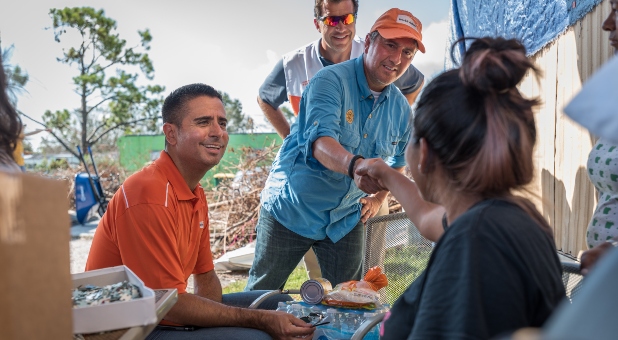The Huge Role Pastors Must Play as We Battle COVID-19
COVID-19 is the kind of rapidly moving crisis that makes us scramble for reliable information from medical officials—the more initials behind their names, the better. When we’re panicked about protecting ourselves, we hope doctors and epidemiologists will give us all the answers.
But there is another important but often overlooked source of help in every community that can make the difference in a health emergency.
This is a tremendous moment for pastors and church leaders. We are in a time, much like the days following the Sept. 11 terrorist attacks on our nation, when only the wisdom of Christian leaders like Billy Graham could calm us in our uncertainty and fear. Today, even with social distancing and virtual services, our pastors provide comfort and speak truth that helps us navigate unsettling news and upended daily routines.
More than stewarding our emotional and spiritual health, pastors and faith leaders are catalysts for community action. That’s why World Vision works with local church leaders in the U.S. and around the world. In 2019 alone, we mobilized and trained more than 150,000 pastors, priests and other faith leaders to serve their communities for health, child protection, clean water and more. As trusted and influential figures, they can galvanize communities like no one else.
During Hurricane Harvey, we worked with churches who literally opened their doors to provide relief supplies even as their own buildings were damaged in the storm. I went to Florida after Hurricane Irma and saw how churches were the lifeline for hundreds of families who lost everything.
Globally, we saw African church leaders mobilize communities in truly miraculous ways during the AIDS pandemic in the 2000s. Humanitarian work alone never could have halted the spread of HIV across the continent. Empowered by a World Vision workshop, pastors were able to address the underlying beliefs about AIDS that led to lifting the stigma and changing behaviors.
Thousands of church leaders also developed Community Care Coalitions to care for vulnerable children and families. At their peak, these groups provided home-based care for 1.2 million orphans and vulnerable children and more than 100,000 critically ill adults. Church-mobilized coalitions were so effective that governments in Kenya and Zimbabwe later relied on that model to bring child programs to their communities.
Another example was Sierra Leone in 2014, during the worst Ebola crisis in history. Sierra Leone had the largest number of infections and the highest death toll in all of West Africa. Its health system had been ravaged by civil war from 1991-2002. And yet none of the 59,000 World Vision-supported children and families died during the outbreak. Why?
The answer: Faith leaders, driving their communities to action, made the difference against Ebola. As we did with AIDS, World Vision equipped faith leaders to combat fear and misinformation and promote ways families could protect themselves. Today, those same faith leaders and many others are being trained and starting to use this Ebola experience to fight COVID-19 by mobilizing hand-washing trainings and other protection measures.
These examples inspire me as COVID-19 spreads not just illness, but also fear and anxiety, around the globe—affecting us here in the U.S. too.
But pastors are on the front lines, finding ways to pray and comfort congregations even as the physical church can’t meet. We see churches mobilizing to check in on seniors and the most vulnerable, or providing meals for children who are out of school and are unable to access free and reduced lunch. And we’re seeing faith leaders helping one another, like Coronavirus and The Church, a website set up by Peace Plan, the Billy Graham Center and Humanitarian Disaster Institute.
We’ll get through this crisis if communities pull together and care for the most vulnerable. And that’s where churches shine.
In Acts 20:28 (ESV), Paul spoke to church elders in Ephesus and encouraged them to “pay careful attention to yourselves and to all the flock, in which the Holy Spirit has made you overseers.” When our faith leaders stand against fear and confusion in a crisis and care for the most vulnerable in the name of Christ, hope rises in communities and the glory goes to God. {eoa}
Edgar Sandoval Sr. is president of World Vision U.S. Follow him at twitter.com/EdgarSandovalSr.
















































